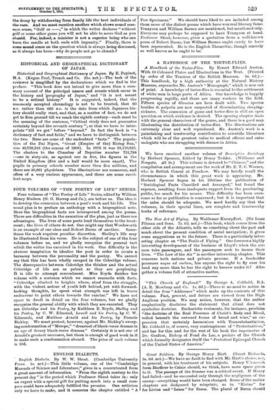FOUR VOLUMES OF "THE POETRY OF LIFE" SERIES.
Four volumes of " The Poetry of Life " Series, edited by William Henry Hudson (G. G. Harrap and Co.), are before us. The idea is to develop the connexion between a poet's work and his life. The usual plan is to preface an anthology with a biographical note. Here the biographical facts are interspersed among the poems. There are difficulties in the execution of the plan, just as there are advantages. The lives of some poets lend themselves to the treat- ment ; the lives of others do not. One might say that Wordsworth is an example of one class and Robert Burns of another. Some- times the work requires peculiar discretion. Shelley's life may be illustrated from his verse. He is the subject of one of the four volumes before us, and we gladly recognize the general tact which the writer has exercised in his work. One difficulty is the obvious temptation to idealize the poet in order to create a harmony between the personality and the poetry. We cannot say that this has been wholly escaped in the Coleridge volume. The discrepancies between Coleridge the thinker and the actual Coleridge of life are as patent as they are perplexing. ft is idle to attempt concealment. Miss Royds finishes her volume with a sentence which we cannot reconcile with facts. " Coleridge climbed to heights where, aloof from the struggle, with the violent ardour of youth left behind, yet with forward- looking thoughts, he spent what strength was left in brave endeavour to point others towards the sunrise." We have not space to dwell in detail on the four volumes, but we gladly recognize the general ability with which they are executed. They are Coleridge and his Poetry, by Kathleen E. Royds, Shelley and his Poetry, by C. W. Edmund, Lowell and his Poetry, by C. W. Edmunds, and Matthew Arnold and his Poetry, by Francis Bickley. We must protest, however, against Mr. Bickley's sweep- ing condemnation of "Merope," " dreariest of blank-verse dramas in an age of dreary blank-verse dramas." Certainly it is not one of Arnold's greatest successes, but there is enough of good work in it to make such a, condemnation absurd. The price of each volume is 10d.






























































 Previous page
Previous page